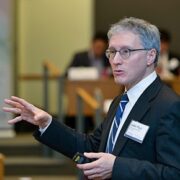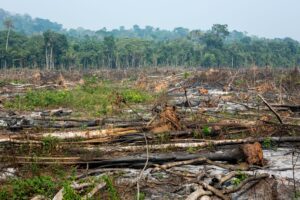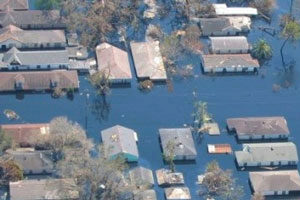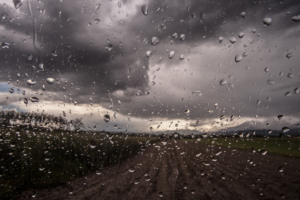The Wharton Climate Center brings together stakeholders from academia, government, communities, and the private sector to conduct academically rigorous, practically relevant research on topics such as climate change, renewable energy, air and water pollution, waste disposal, biodiversity, and deforestation. Our core research areas include how climate risk impacts business strategy and financial markets, how environmental policies and markets transform the energy and transportation sectors across countries at different stages of economic development, and climate and environmental ethics.
Knowledge at Wharton’s
Ripple Effect Podcast
Every day, business scholars answer pressing questions in their research — but what do their insights mean for you? In this podcast, Wharton faculty dive into what inspired their studies and how their findings resonate with the world today. Learn how research insights translate into knowledge you can use, with host Dan Loney.
Why Climate Risk Is Financial Risk | Witold Henisz
Why Is Greenwashing So Concerning? | Sarah Light
Who Does Climate Change Hit the Hardest? | Susanna Berkouwer
Who Is Responsible for the Planet? | Brian Berkey
The Wharton Climate Center is proud to be a Leading Partner of ClimateCAP

ClimateCAP is a partnership of more than 35 leading business schools collaborating to prepare MBA students to understand and respond to the climate challenge. Managed by Duke University’s Fuqua School of Business, ClimateCAP offers unique opportunities for faculty, staff, and MBA students at Partner Schools. We encourage all Wharton MBA students to take full advantage of the events, programs, and resources offered to you for free as part of the Wharton Climate Center’s partnership.
Faculty Leadership

ARTHUR VAN BENTHEM
Associate Professor of Business Economics and Public Policy
Faculty Co-Director, Wharton Climate Center

SARAH E. LIGHT
Mitchell J. Blutt and Margo Krody Blutt Presidential Professor Professor of Legal Studies & Business Ethics
Faculty Co-Director, Wharton Climate Center
Affiliated Scholars

Hamsa Bastani
Associate Professor of Operations, Information and Decisions
Associate Professor of Statistics and Data Science
Research Areas: Machine Learning Algorithms and Applications to Healthcare; Revenue Management; Social Good

Brian Berkey
Associate Professor of Legal Studies & Business Ethics
Research Areas: Climate Ethics; Climate Justice; Animal Ethics

Susanna Berkouwer
Assistant Professor in Business Economics & Public Policy
Research Areas: Environmental Economics; Development Economics; Political Economy; Behavioral Economics

Sanya Carley
Presidential Distinguished Professor of Energy Policy and City Planning
Research areas: Energy Justice and Just Transitions; Energy Insecurity; Electricity and Transportation Policies; Public Perceptions of Energy Infrastructure and Technologies

Francis X. Diebold
Paul F. Miller, Jr. and E. Warren Shafer Miller Professor of Social Sciences
Professor of Economics, Finance and Statistics
Research areas: Dynamic Predictive Climate Modeling; Actic Sea Ice; Climate Econometrics

Daniel Garrett
Assistant Professor of Finance
Research areas: Public Finance, Financial Intermediation, Corporate Finance, Taxation

Mirko Heinle
Associate Professor of Accounting
Research areas: Theoretical Research in Financial and Managerial Accounting

Witold Henisz
Vice Dean and Faculty Director, ESG Initiative
Deloitte & Touche Professor of Management in Honor of Russell E. Palmer, former Managing Partner
Research Areas: Climate Risk Disclosure; Materiality & Management of ESG Factors

Benjamin Keys
Rowan Family Foundation Professor
Professor of Real Estate
Professor of Finance
Research Areas: Property Markets; Housing Markets; Mortgage Markets

Steven Kimbrough
Professor of Operations, Information, and Decisions
Research Areas: Risk & Uncertainty; Deep Decarbonation Pathways; Market Design

Cait Lamberton
Duran President’s Distinguished Professor of Marketing
Research areas: Consumer Psychology; Financial Decision Making; Risk Management

John Paul Macduffie
Professor of Management
Research Areas: Vehicle & Mobility Innovations; Urban Transportation; Environmental Law & Policy

Eric Orts
Guardsmark Professor
Professor of Legal Studies & Business Ethics and Professor of Management
Research Areas: Corporate Governance, Environmental Law and Policy, Environmental Management, Professional Ethics, Securities Regulation, Democratic Theory, Constitutional law

Jisung Park
Assistant Professor, School of Social Policy and Practice and Business Economics and Public Policy at Wharton
Research areas: Climate Impacts; Climate Adaptation; Climate Equity

Leandro S. Pongeluppe
Assistant Professor of Management
Research Areas: Stakeholder Management and Socioeconomic Development

Sandra Schafhäutle
Assistant Professor of Accounting
Research Areas: Use of Information in Capital Markets; Corporate Disclosure; Transparency and Disclosure Incentives; Supply Chains

Nicolaj Siggelkow
David M Knott Professor
Vice Dean, Wharton MBA Program
Co-Director, Mack Institute for Innovation Management
Professor of Management
Research Areas: Environmental Sustainability and Competitive Advantage; Connected Strategy

Luke Taylor
John B. Neff Professor in Finance, Professor of Finance
Co-Director, Rodney L. White Center for Financial Research
Coordinator of Finance PhD Program
Research Areas: Sustainable Investing, Climate Finance
Contributing Doctoral Students
Postdoctoral Research Associate, ESG Initiative
Doctoral Student, Operations, Information and Decisions Department
Doctoral Student, Business Economics and Public Policy Department
Doctoral Student, Business Economics and Public Policy Department
Doctoral Student, Operations, Information and Decisions Department
Doctoral Student, Business Economics and Public Policy Department
Featured Research

In the following papers, Wharton’s Francis X. Diebold and his co-authors evaluate forecasts of Arctic sea ice based on cumulative carbon dioxide emissions. Their findings suggest that for a given future emissions path, an ice-free Arctic is likely to occur much earlier than global climate models project:
Climate Models Underestimate the Sensitivity of Arctic Sea Ice to Carbon Emissions; Assessing and Comparing Fixed-Target Forecasts of Arctic Sea Ice: Glide Charts for Feature-Engineered Linear Regression and Machine Learning Models; When Will Arctic Sea Ice Disappear? Projections of Area, Extent, Thickness, and Volume; Probability Assessments of an Ice-Free Arctic: Comparing Statistical and Climate Model Projections; A Benchmark Model for Fixed-Target Arctic Sea Ice Forecasting
In Commodity Supply Chains and Local Environmental Regulation, Wharton’s Sandra G. Schafhäutle examines the effects of local environmental regulation on the sourcing patterns of commodity trading firms (i.e., firms that source commodities from upstream producers and distribute these commodities further downstream). She concludes that upstream supply chain shocks can have transmission effects on agents further down in supply chains, evidenced by global trading firms adopting firm-wide sourcing strategies that can shape the efficacy of local environmental regulation.


In Heroes or Villains? Agribusiness Leaders in the Amazon Region, Wharton’s Leandro S. Pongeluppe and co-authors Gustavo Simoes Cordeiro, Paulo Roberto Arvate, and Joana Sabrina Pereira Story examine the effects of leaders’ occupational background in agribusiness on economic development and environmental preservation. Their findings suggest that agribusiness leaders are more effective than their non-agribusiness counterparts in promoting the creation of new businesses in their municipalities.
In There Is No Planet B: Aligning Stakeholder Interests to Preserve the Amazon Rainforest, Wharton’s Leandro S. Pongeluppe and Anita M. McGahan investigate the possibility that firms may avoid the tragedy of the commons by aligning the interests of critical proximate stakeholders in ways that governments cannot accomplish, by analyzing Amazon rainforest preservation by Natura, a Brazilian cosmetics company. The results indicate that Natura internalized environmental externalities by linking ecologically conscious consumers with rural Amazonian communities.


In When is it Permissible to Impose and Offset Risks?: A Response to Barry and Cullity, Wharton’s Brian Berkey highlights some reasons to be skeptical about Christian Barry and Garrett Cullity’s argument that there is a morally important distinction between offsetting by “sequestering” and offsetting by “forestalling.” Berkey suggests an alternative account of the conditions, in which offsetting can make a riskimposing action permissible, and notes a significant implication of his argument for the ethics of greenhouse gas offsetting.
In Anti-Woke Capitalism, the First Amendment, and the Decline of Libertarianism, Wharton’s Sarah E. Light and Amanda Shanor trace how so-called “anti-woke capitalism” laws represent a fundamental shift in the conservative legal movement the United States away from laissez-faire law and policy. They offer the first in-depth constitutional analysis of these so-called “anti-woke capitalism” laws under the First Amendment, and articulate the questions and constitutional values that should guide analyses of these laws and others like them that regulate social practices at the intersection of political and economic life.


In The Impact of Impact Investing, Wharton’s Jules H. van Binsbergen and co-author Jonathan Berk demonstrate that the impact on the cost of capital that results from a divestiture strategy is too small to meaningfully affect real investment decisions, empirically corroborating these small estimates by studying firm changes in ESG status. Their results suggest that to have impact, instead of divesting, socially conscious investors should invest and exercise their rights of control to change corporate policy.
In The Future of Emissions, Wharton’s Jules H. van Binsbergen and co-author Andreas Brøgger argue for the introduction of firm-level emission futures contracts as a novel way of assessing the real impact of ESG initiatives. They establish that backward-looking subjective ratings are limited by their failure to capture future reductions in emissions. As a result, investors may inadvertently allocate their money to firms that pollute more, not less. They discuss several applications of their new measure, including executive pay and investment management.


In Study: Green Energy Transition May Leave Some Workers Behind, Wharton’s R. Jisung Park and co-authors E. Mark Curtis and Layla O’Kane explore how workers may be affected by a shrinking labor market in carbon-intensive, or “dirty,” industries due to climate mitigation policies. Their analysis of data finds the rate of workers transitioning from dirty to green jobs rapidly increasing, as well as the number of available green jobs, including those that offer similar opportunities for longer-term employment, to be on the rise.
Last fall, Perry World House and the Wharton Climate Center brought together experts from policy and academia for our Global Climate Finance Workshop. The workshop report explores financial policy solutions to the climate crisis, the role the private sector should play, and how existing systems can be changed to better support climate adaptation and mitigation.


In Gas, Guns, and Governments: Financial Costs of Anti-ESG Policies, Wharton’s Daniel Garrett and co-author Ivan Ivanov of the Federal Reserve demonstrate that government regulation limiting the adoption of ESG policies distorts financial market outcomes. Their analysis of a 2021 Texas law prohibiting municipalities from contracting with banks adopting ESG policies suggests that Texas entities will pay an additional $303-$532 million in interest on the $32 billion in borrowing during the first eight months following the laws’ adoption.
In the paper Designing More Cost-Effective Trading Markets for Renewable Energy, Arthur van Benthem and co-authors study the design of state-specific renewable energy portfolios standards. The study finds that combining separate state markets into a wider regional market and ramping up interim targets progressively over time can reduce the cost of meeting green energy targets substantially, thereby avoiding escalating costs and preserving the political feasibility of renewable energy standards.


The world is under pressure to deliver on the Paris Agreement and individual countries are enacting policies such as phasing out coal, supporting renewable energy, and taxing aviation. In Overlapping Climate Policies, Arthur van Benthem and co-authors, Grischa Perino and Robert Ritz, show that when such policies overlap with a wider carbon-pricing scheme like the EU ETS, the climate effect of renewable energy subsidies is amplified, but fossil fuel bans and taxes can backfire.
Gas prices continue to climb, surpassing $6/gallon in some U.S. states. For today’s teenage drivers, the reverberations of these price shocks will be felt for years to come. According to a new study, Formative Experiences and the Price of Gasoline, by Chris Severen, a senior economist at the Federal Reserve Bank of Philadelphia, and Arthur van Benthem, Wharton professor of business economics and public policy, oil crises during your formative years shape driving behavior later in life.


Benjamin Keys and Philip Mulder assess the impact of climate change on the built environment, both residential and commercial real estate, and the various holders of risk in these markets (investors, insurers, lenders). In a recent paper, Neglected No More: Housing Markets, Mortgage Lending, and Sea Level Rise, they find that home sales volumes in communities not exposed to sea level rise declined 16-20% relative to less exposed areas, and eventually real estate prices in exposed areas decreased.
Recent explosive growth in environmental and climate-related marketing claims by business firms has raised concerns about whether such claims are real or constitute greenwashing. Sarah E. Light’s research examines the role of government regulators, including financial regulators like the Securities and Exchange Commission, in addressing concerns about greenwashing. In Greenwashing and the First Amendment, Light and co-author Amanda Shanor demonstrate that disclosure requirements, including the SEC’s recent proposed rule requiring disclosure of climate-related risk and emissions information, are consistent with First Amendment doctrines surrounding commercial speech.


In Dissecting Green Returns, Wharton’s Robert Stambaugh and Luke Taylor and their co-author Lubos Pastor show empirically that green assets delivered high returns in recent years. This performance reflects unexpectedly substantial increases in concerns about climate change, not high expected returns. They estimate lower expected returns on environmentally friendly assets, including German green bonds and U.S. stocks.
Lubos Pastor, Robert Stambaugh, and Luke Taylor show that greener assets have lower expected returns due to investors’ green preferences and green assets’ ability to hedge climate risk. Green assets can nevertheless outperform when climate concerns increase unexpectedly. Their paper Sustainable Investing in Equilibrium recently won the 2021 Fama-DFA Prize for best paper on capital markets and asset pricing at the Journal of Financial Economics.


Rapid decreases in the amount of Arctic sea ice have far-reaching impacts on the global environment and economy. In their paper Probability Assessments of an Ice-Free Arctic: Comparing Statistical and Climate Model Projections, Wharton’s Francis Diebold and Glenn Rudebusch from the Federal Reserve Bank of San Francisco provide statistical forecasts of Arctic sea ice extent for the 21st century and a probability assessment of the timing of an ice-free Arctic, with results indicating an almost 60 percent chance of an ice-free Arctic Ocean during the 2030s.
With the rampant climate emergency, Wharton’s Eric Orts and Brain Berkey urge businesses, especially carbon majors, to abide by a climate imperative that calls for operating responsibly in a way that limits GHG emissions to a level that is compatible with the recommended global emission limits. This requires revising the traditional profit-maximization approach, which can frequently conflict with the goal of emission reductions even with policy corrections. Their paper, The Climate Imperative for Business, recommends four constructive strategies for businesses to effectively embrace the climate imperative.


Artificial intelligence (AI) has been increasingly applied in supporting climate change projections, but limited work has leveraged AI to address climate change adaptation. In Artificial Intelligence for Climate Change Adaptation, Wharton’s Hamsa Bastani and coauthors So-Min Cheong from the University of Kansas and Kris Sankaran from the University of Wisconsin-Madison identify the gap in AI applications, highlight the value of AI in supporting adaptation choices and implementation, and illustrate how AI can unlock valuable information in scarce-data settings and enable better decision making and tailor adaptation measures.
In a forthcoming article in the American Economic Review, Wharton’s Susanna Berkouwer and co-author Joshua Dean from the University of Chicago investigate the adoption of energy-efficient technologies by low-income households in Kenya. They find that improved cookstoves reduce charcoal usage by 39%, which corresponds to 3.5 tons of CO2e per year (valued at $295 over the two-year lifetime of the stove when using a social cost of carbon of $42) in addition to $237 in private financial savings from reduced fuel expenditures. They identify credit constraints as a major barrier to adoption: demand doubles when participants are offered a 3-month loan to adopt the stove.


For Wharton’s Steven O. Kimbrough, the University of Pennsylvania’s Robin Clark, and co-author Christine Chou, two important research questions arose from the 2010 U.S. Securities and Exchange Commission (SEC) Advisory on climate change reporting: (1) How does the discussion of climate change in SEC filings change after the Advisory? and (2) What are firms talking about when they talk about climate change? In What do firms say in reporting on impacts of climate change? An approach to monitoring ESG actions and environmental policy, they find that firms with comparatively larger transition risks tend to discuss climate change comparatively more, focusing on regulation-related topics. Meanwhile, firms exposed to the physical risks of climate change tend to discuss climate change somewhat less, focusing on meteorological topics.
To mitigate environmental and social harm, policy-makers often provide incentives or impose sanctions to discourage harmful behavior. In Are Bans Effective under Limited Monitoring? Evidence from High Seas Management, Wharton’s Hamsa Bastani and co-author Joann F. de Zegher from the Massachusetts Institute of Technology (MIT) find that a ban on seafood transshipments on the high seas reduces the yearly growth in transshipment rates by an estimated 58% despite significant monitoring challenges, and does not cause appreciable strategic behavior. A difference-in-differences analysis of landing prices suggests that this reduction comes at an estimated cost of 3% higher raw material prices.

Featured publications
Severen, C., & van Benthem, A.A. Formative Experiences and the Price of Gasoline. Forthcoming in the American Economic Journal: Applied Economics.
Berkey, B. Prospects for an Animal-Friendly Business Ethics. Forthcoming in Animals and Business Ethics (Springer).
Berkouwer, S.B., Biscaye, P.E., Puller, S., & Wolfram, C.D. (2022). Disbursing emergency relief through utilities: Evidence from Ghana. Journal of Development Economics, 102826.
Bhutta, N., & Keys, B. (2022). “Moral Hazard during the Housing Boom: Evidence from Private Mortgage Insurance.” Review of Financial Studies, 35(2): 771–813.
Berkouwer, S., Wolfram, C., Miguel, E., & Hsu, E. “What does donor conditionality do? Causal evidence from Kenyan electrification.”
McGlinch, J., & Henisz, W. “Reexamining the Win-Win: Relational Capital, Stakeholder Issue Salience, and the Contingent Benefits of Value Based Environmental, Social and Governance (ESG) Strategies.” (Under Review)
Perino, G., Ritz, R.A., & van Benthem, A.A. “Cancelling Carbon in Cap-and-Trade Systems.” Latest draft: February 2022.
Abito J.M., Flores-Golfin, F., van Benthem, A.A. & Vasey, G. “Designing More Cost-Effective Trading Markets for Renewable Energy.” Latest draft: February 2022.
Berkey, B., & Orts, E.W. (2021). The Climate Imperative for Business. California Management Review (Insights/Frontier).
Abito, J.M, Knittel, C.R., Metaxoglou, K., & Trindade, A, “The Role of Output Reallocation and Investment in Coordinating Environmental Markets.” Revise & Resubmit at International Journal of Industrial Organization.
Berkouwer, S., & Dean, J.T. “Credit, attention, and externalities in the adoption of energy efficient technologies by low-income households.” Revise & Resubmit at the American Economic Review.
Perino, G., Ritz, R.A.& van Benthem, A.A. “Understanding Overlapping Policies: Internal Carbon Leakage and the Punctured Waterbed.” Latest draft: December 2021.
Jacobsen, M.R., Sallee, J.M., Shapiro J.S., & van Benthem, A.A. “Regulating Untaxable Externalities: Are Vehicle Air Pollution Standards Effective and Efficient?” Latest draft: December 2021.
Berkouwer, S., Adkins, J., Hsu, E., Klugman, N., Streff, A., & Wall, A. (2021). What’s reliability without voltage quality? Energy for Growth Hub. November 29.
van Benthem, A.A., Crooks, E., Giglio, S., Schwob, E., & Stroebel, J.C. “Climate Risks, Financial Markets, and the Energy Sector.” Latest draft: October 2021.
Han, J.S., Houde, J.F., van Benthem, A.A. & Abito, J.M. “Agency Frictions and Procurement: New Evidence from U.S. Electricity Restructuring.” Latest draft: August 2021.
Light, S.E., & Skinner, C.P. (2021). Banks and Climate Governance. 121 Columbia Law Review 1895.
Gillingham, K.T., Houde, S., & van Benthem, A.A. (2021). Consumer myopia in vehicle purchases: evidence from a natural experiment. American Economic Journal: Economic Policy, 13(3), 207-38.
Han, J.S., Houde, J.F., van Benthem, A.A. & Abito, J.M. (2021). When Does Regulation Distort Costs? Lessons from Fuel Procurement in US Electricity Generation: Comment. American Economic Review, 111(4): 1356-1372.
MacDuffie, J.P., & Light. S.E. (2021). EV Turning Point: Momentum Builds for U.S. Electric Vehicle Transition. Yale Environment 360.
Light, S.E. (2021). National Parks, Incorporated. University of Pennsylvania Law Review, 169, Rev. 33.
Abito, J.M. (2020). Measuring the Welfare Gains from Optimal Incentive Regulation. Review of Economic Studies, 87(5): 2019–2048,
Engström, G., Gars, J., Jaakkola, N., Lindahl, T., Spiro, D., & van Benthem, A.A. (2020). What Policies Address Both the Coronavirus Crisis and the Climate Crisis? Environmental and Resource Economics 76(4): 789-810.
Wiley, H.J.P., & Kousky, C. (2020). Speeding Up Post-Disaster Housing Buyouts. Solutions. 11(3). September.
Bento, A.M., Jacobsen, M.R., Knittel, C.R., & van Benthem, A.A. (2020). Estimating the Costs and Benefits of Fuel Economy Standards. In: M.J. Kotchen, J.H. Stock, and C.D. Wolfram (eds.), Environmental and Energy Policy and the Economy 1.
Berkouwer, S.B. (2020). Electric Heating and the Effects of Temperature on Household Electricity Consumption in South Africa. The Energy Journal, 41:04
Schneeman, B.O., Lamberton, C., et al. (2020). A National Strategy to Reduce Food Waste at the Consumer Level. National Academies of Sciences, Engineering, and Medicine. Washington, DC: The National Academies Press. https://doi.org/10.17226/25876.
Jacobsen, M.R., Knittel, C.R., Sallee J.M., & van Benthem, A.A. (2020). The Use of Regression Statistics to Analyze Imperfect Pricing Policies. Journal of Political Economy 128(5).
Kunreuther, H. & Slovic, P. (2020). What the Coronavirus Curve Teaches Us About Climate Change. Politico Magazine. March.
A Brief History
Recognizing the emerging needs of its students and society at large, Wharton unified several of its existing centers, each with an extensive history of expertise in environmental, social, and governance topics, to form the ESG Initiative on July 1, 2022. Formerly known as The Wharton Risk Management and Decision Processes Center, the Wharton Climate Center brings more than 37 years of academic rigor and research, ranging from climate change, to energy markets, to disaster risk financing and reduction strategies.


